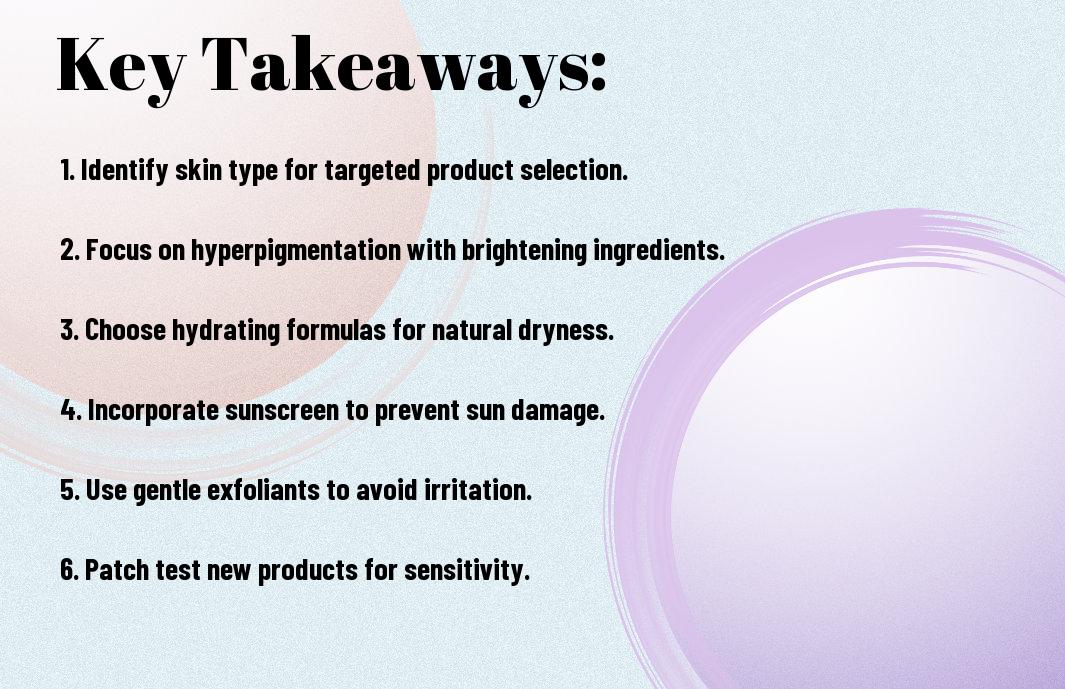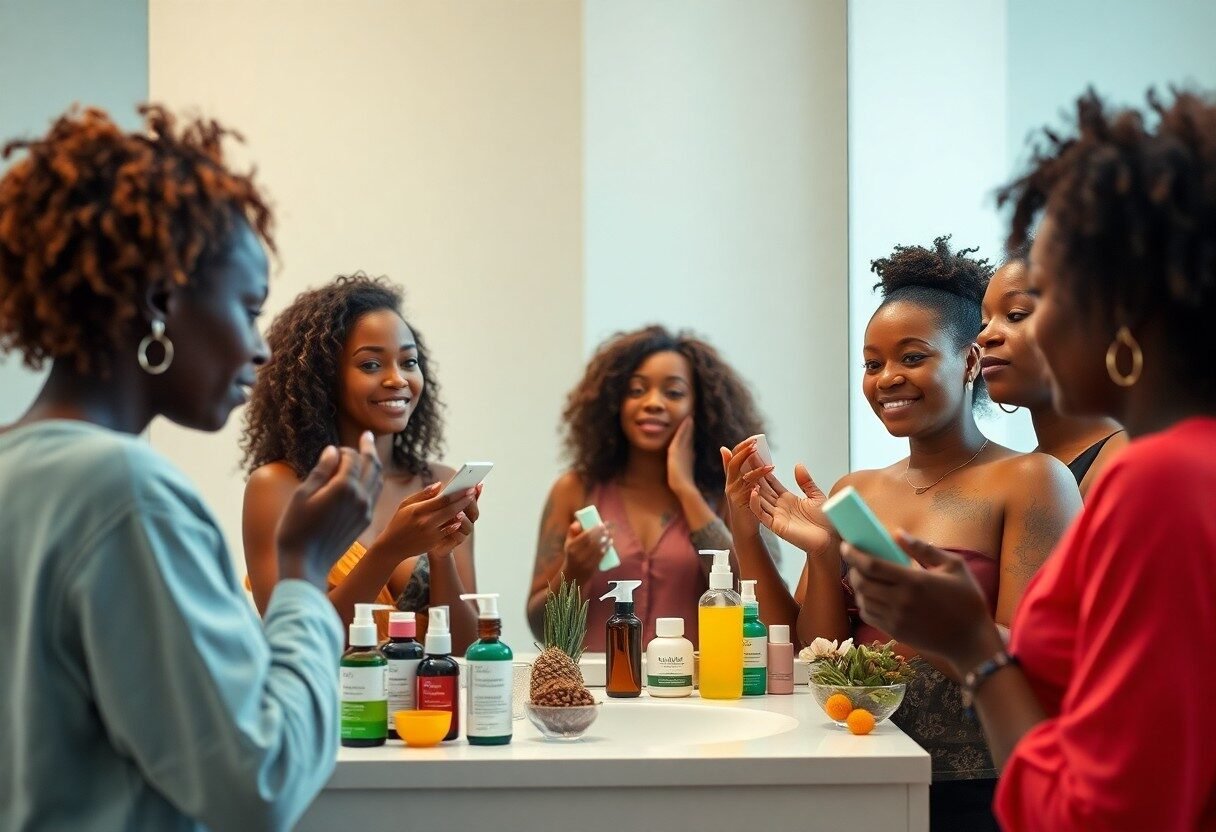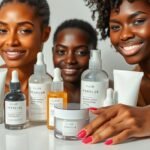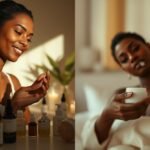
It’s imperative to tailor your skincare routine to meet the unique needs of your skin. As an African American woman, you may face specific concerns such as hyperpigmentation, dryness, and sensitivity. Understanding your skin type and addressing these challenges will help you achieve a healthy, radiant complexion. In this post, I will guide you through effective strategies and product recommendations that cater to your specific skin issues, ensuring you feel confident and empowered in your skincare journey.
Key Takeaways:
- Understanding your skin type is important; African American women may experience a range of skin types, including oily, dry, combination, and sensitive.
- Hyperpigmentation is a common concern; incorporating ingredients like vitamin C, licorice root, and niacinamide can help to brighten and even out skin tone.
- Moisturization is key, as African American skin can often be prone to dryness; look for creams that include hyaluronic acid, shea butter, or ceramides for effective hydration.
- Sun protection is vital; using a broad-spectrum sunscreen with at least SPF 30 helps prevent further hyperpigmentation and protects against UV damage.
- Incorporate gentle exfoliation into your routine; using products with alpha hydroxy acids (AHAs) or beta hydroxy acids (BHAs) can help improve skin texture and reduce dullness.
- Be cautious with harsh ingredients; products containing alcohol or strong fragrances may irritate the skin and can exacerbate sensitivity.
- Consider professional guidance; consulting with a dermatologist can help develop a personalized skincare routine tailored to unique skin concerns.

The Unique Dynamics of African American Skin
African American skin shows unique characteristics shaped by its rich melanin content, which serves as a natural barrier against UV rays, reducing the risk of skin cancer. However, this also leads to specific challenges, including hyperpigmentation and a tendency for keloids and other scar formations. The varying skin types within the African American community—from oily to dry—further complicate the personalization of skincare routines. Tailoring approaches to these unique dynamics fosters both skin health and beauty.
Melanin and Its Role in Skin Concerns
Melanin not only provides the beautiful hue in African American skin but also contributes to varied responses to skincare treatments. With increased melanin, the skin often displays a higher propensity for conditions like hyperpigmentation, especially following inflammation or injury. This characteristic necessitates specific skincare products aimed at evening skin tone while nourishing its unique structure.
Common Skin Issues Faced by African American Women
Various skin conditions are prevalent among African American women, with hyperpigmentation, acne, and dry skin topping the list. The variations in skin properties can lead to heightened visibility of dark spots and make certain products less effective, prompting the need for meticulous ingredient selection. Additionally, skin prone to keloids may require careful treatment approaches to avoid exacerbating scars.
Many African American women contend with challenges such as dark spots resulting from post-inflammatory hyperpigmentation, which is often a response to acne or irritation. The natural oils in darker skin types can sometimes cause clogged pores and breakouts, necessitating targeted treatments. Understanding the interplay between melanin and skin health is crucial for developing effective routines tailored to these specific concerns, allowing for radiant, healthy skin.
Building Your Tailored Skincare Arsenal
Creating a personalized skincare arsenal is vital for addressing the unique needs of your skin. Start by identifying products that cater specifically to your concerns, such as dryness, hyperpigmentation, or acne. Investing in quality over quantity is imperative; a fewer well-chosen products can yield better results than a vast array of items that may not serve your skin. Prioritize hydration and protection while slowly introducing new products to observe how your skin reacts.
Essential Ingredients for Melanin-Rich Skin
For melanin-rich skin, certain ingredients can significantly enhance your skincare routine. Look for niacinamide, which brightens and evens skin tone, as well as vitamin C for its antioxidant properties and ability to fade dark spots. Hyaluronic acid supports hydration, while retinoids can help address fine lines and uneven texture. Additionally, ceramides protect the skin barrier and maintain moisture levels, making these key players in your routine.
Skincare Products to Prioritize and Avoid
Your skincare routine should prioritize products that nourish and protect your unique skin. Opt for *gentle cleansers* that don’t strip the natural oils from your skin. *Moisturizers with SPF* are vital for preventing sun damage and maintaining even skin tone. Avoid products with harsh fragrances, alcohol, and sulfates, which can irritate and exacerbate dryness or breakouts. Instead, look for ingredients that hydrate, calm, and heal.
The right products can enhance your skincare journey significantly. Prioritize hydrating serums and cream formulations designed for melanin-rich skin, which often require added moisture due to susceptibility to dryness. Avoid heavy exfoliants, as they may lead to irritation, and choose *chemical exfoliants* like lactic acid or glycolic acid at lower concentrations for gentle yet effective results. Recognizing and steering clear of products that contain potentially irritating ingredients will help maintain your skin’s balance and overall health.
The Art of Layering: Creating an Effective Routine
Layering products is an artistic process that involves strategically applying skincare items to maximize their benefits. Start with a cleanser to remove impurities, followed by a toner, which preps the skin for better absorption. Next, add treatment serums targeting specific concerns, such as hyperpigmentation or dryness. Seal everything with a moisturizer to lock in hydration and finish off with sunscreen during the day. Each layer should complement the others, allowing active ingredients to work harmoniously for optimal skin health.
Morning vs. Evening Regimen Strategies
Your skincare regimen should differ between morning and evening to cater to your skin’s needs. Mornings focus on protection and hydration, which might include lightweight moisturizers and sunscreen to fend off environmental aggressors. In contrast, your evening routine can be more intensive, incorporating heavier creams, serums, or retinoids that aid in repair and rejuvenation while you sleep, allowing the skin to fully benefit from active ingredients without external interference.
The Importance of Sunscreen and Moisturizers
Daily application of sunscreen and a good moisturizer can significantly enhance the health of your skin. Sunscreen protects against harmful UV rays that can lead to skin discoloration, premature aging, and even skin cancer, which affects people of all skin tones. A suitable moisturizer helps maintain the skin’s hydration barrier, particularly vital for African American skin, which can be more prone to dryness and ashiness.
Choosing a broad-spectrum sunscreen with at least SPF 30 is imperative, even on cloudy days, as UV rays penetrate clouds and cause damage. Opt for a moisturizer that contains hydrating ingredients like hyaluronic acid or shea butter, which address specific concerns like dryness and uneven texture. Layering these products thoughtfully ensures that your skin stays protected and nourished, supporting an overall radiant complexion.
Recognizing and Responding to Skin Changes
Being attuned to changes in your skin can significantly impact your routine and the health of your complexion. Look for signs such as increased dryness, discoloration, or breakouts, as these often signal underlying issues that may need addressing. For African American women, conditions like hyperpigmentation can become more pronounced due to hormonal fluctuations or environmental factors, so taking the time to assess your skin regularly is imperative for timely intervention.
Hormonal Influences and Seasonal Adjustments
Your skin can react differently depending on hormonal changes throughout your menstrual cycle or life events like pregnancy. Seasonal variations also play a role; colder months can lead to dehydration, while summer might increase oiliness or sun exposure risks. Adjusting your products seasonally and being aware of hormonal impacts allows for more effective management of your skincare routine.
When to Seek Professional Advice
If you notice persistent skin concerns, such as unexplained rashes or severe breakouts, consulting a dermatologist can provide clarity on the best course of action. They can offer insight into specific treatments and help identify conditions like eczema or acne that may require tailored interventions. Early consultations help prevent issues from escalating, ensuring your skin receives the targeted care it needs.
It’s smart to prioritize professional advice if over-the-counter remedies fail to deliver results within a few weeks. A qualified dermatologist can conduct necessary tests, recommend prescription-strength treatments, and help you navigate more complex conditions. For African American women who may experience unique skin challenges such as keloids or post-inflammatory hyperpigmentation, specialized care is vital in developing an effective treatment strategy.

Cultural Significance: Incorporating Heritage into Your Skincare Rituals
Embracing your cultural heritage can enhance your skincare rituals by integrating traditional approaches with modern techniques. I find that connecting with my roots not only adds emotional significance to my routines but also introduces effective, time-tested ingredients. Performing rituals passed down through generations fosters a deeper appreciation for my skin and its unique needs, reminding me that beauty is not only about appearance but also about cultural identity.
Traditional Remedies and Their Modern Interpretation
Utilizing traditional remedies can offer exceptional benefits for African American skin. Ingredients such as shea butter and coconut oil, often found in ancestral practices, remain popular today for their moisturizing properties. These ingredients, combined with modern formulations, create a powerful blend that addresses dryness and enhances skin elasticity while providing a connection to heritage.
Celebrating Diversity in Skincare Practices
Our skincare practices are as diverse as our backgrounds, providing a rich tapestry of methods and ingredients. Recognizing the uniqueness of our skin aids in the celebration of various cultures within the African American community. For instance, embracing products inspired by African, Caribbean, and Indigenous traditions allows us to access the wisdom of our ancestors while promoting skin health.
Celebrating diversity in skincare practices enriches my routine by blending diverse ingredients and techniques that resonate with my heritage. You’ll find that rituals can vary greatly—from cleansing with natural oils in West African cultures to utilizing plant-based concoctions celebrated in Caribbean communities. This blending of techniques not only provides practical benefits but also fosters a sense of unity and pride in our shared history, reminding us of the rich resources available to nurture our skin.
Final Words
On the whole, customizing your skincare routine is important for addressing the specific concerns faced by African American women. I encourage you to take time to understand your unique skin type and the issues you may encounter, such as hyperpigmentation or dryness. By selecting targeted products and techniques, you can enhance your skin’s health and beauty. Ultimately, your skincare routine should reflect your individual needs; so, listen to your skin and adjust as necessary to achieve the glowing complexion that truly represents you.
FAQ: Customizing Your Skincare Routine to Address Specific Concerns for African American Women
Q: What specific skincare concerns are common among African American women?
A: Common skincare concerns for African American women often include hyperpigmentation, uneven skin tone, dryness, and sensitivity. Additionally, conditions like razor bumps from shaving and specific issues related to acne scarring may also be prevalent. These concerns are often the result of unique skin types and environmental factors.
Q: How can I determine my skin type to customize my routine effectively?
A: To determine your skin type, observe how your skin feels throughout the day. If it’s oily, you’re likely combination or oily skin; if it feels tight after cleansing, you may have dry skin. Normal skin will feel balanced, while sensitive skin will react easily to products or changes. Conduct a patch test for new products on a small area to see how your skin responds.
Q: What ingredients should I look for to address hyperpigmentation?
A: Ingredients like vitamin C, kojic acid, niacinamide, and alpha hydroxy acids (AHAs) are effective for treating hyperpigmentation. These ingredients help to brighten the skin and even out skin tone. Be cautious with stronger active ingredients, as they can cause irritation; start with lower concentrations and build up as needed.
Q: How often should I exfoliate to improve my skin’s texture?
A: Exfoliation frequency depends on your skin type and the type of exfoliant used. For most skin types, exfoliating 1-2 times a week with a gentle exfoliant is effective. However, if you have sensitive or easily irritated skin, stick to once a week. Monitor your skin’s reaction and adjust accordingly to avoid over-exfoliation.
Q: What are some effective moisturizing products for dry skin?
A: For dry skin, look for products that feature ingredients like hyaluronic acid, glycerin, shea butter, and ceramides. These ingredients help to lock in moisture and provide hydration. Creams and ointments are often more effective than lighter lotions, especially during colder months when skin tends to be dryer.
Q: How can I tailor my routine to combat acne without irritating my skin?
A: To address acne while minimizing irritation, opt for non-comedogenic products. Incorporate benzoyl peroxide or salicylic acid in moderation, and pair with soothing ingredients like aloe vera or green tea extract. Always be mindful of your skin’s tolerance and discontinue use if irritation occurs.
Q: Should I use sunscreen daily, and what type is best for my skin tone?
A: Yes, daily sunscreen use is important to protect your skin from UV damage, which can exacerbate hyperpigmentation and other skin concerns. For deeper skin tones, look for broad-spectrum sunscreens that contain zinc oxide or titanium dioxide, preferably tinted to blend seamlessly with your complexion and avoid a white cast.











